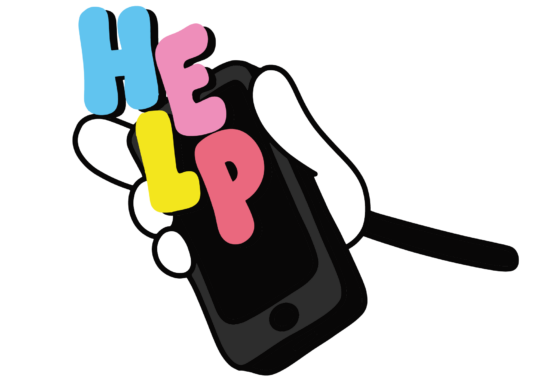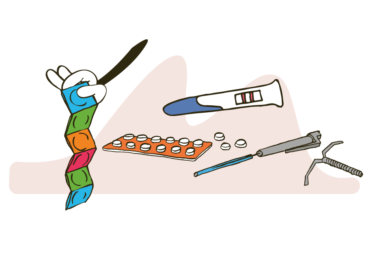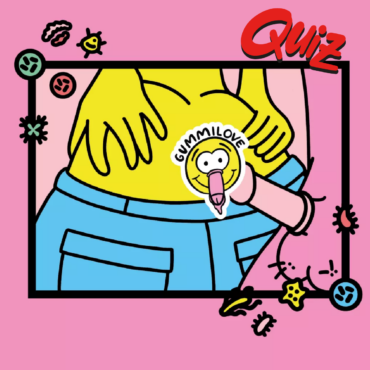1. you are not alone
An unwanted pregnancyPregnancy is the time between the fusion of sperm and egg and the birth of the baby, which normally lasts around 9 months. The first sign of pregnancy is the absence of menstrual bleeding, which would otherwise occur regularly. can bring up many feelings. Even if you think you can't get outOuting, outing: To out someone is to disclose a person's gender identity and/or sexual orientation to another person or group against his/her will. of the situation, you are not alone! Many people have been and will be like this. People become pregnant unintentionally for a variety of reasons. The most common, however, is that there is no contraceptionDamit ist die Verhinderung, resp. Verhütung einer Schwangerschaft gemeint. Dazu stehen viele verschiedene Methoden und Verhütungsmittel zu Verfügung. Die meisten stehen aber leider nur Menschen zur Verfügung, die auch schwanger werden k... that is 100% safe and protects against an unwanted pregnancy. ContraceptiveContraceptives are measures that can help to prevent unwanted pregnancies. Most contraceptives must be taken by girls or people with a uterus. Depending on the product, safety is more or less guaranteed. No method is 100% safe. errors can happen and it is often not the users' fault.
Unfortunately, there are many rumors and myths circulating about unwanted pregnanciesPregnancy is the time between the fusion of sperm and egg and the birth of the baby, which normally lasts around 9 months. The first sign of pregnancy is the absence of menstrual bleeding, which would otherwise occur regularly., so many people who become pregnant unintentionally find it difficult to talk about it because they are afraid of being blamed or rejected. Fortunately, there are great support services that not only advise you about your options, but also help you make a decision.
2. emotional rollercoaster ride
For many, an unwanted pregnancy is an unplanned turn in the course of life that takes them unprepared. The resulting emotional experience is complicated and can often be compared to a rapid rollercoaster ride of emotions.
The first moment can be characterized by shock and disbelief. This shock can lead to denial, a natural protective mechanism that helps us cope with sudden and often overwhelming information. Some hope that the pregnancy testA pregnancy test is a medical test that can confirm pregnancy. It determines whether there are hormonal changes that occur during pregnancy. The test can therefore help to confirm a pregnancy safely and quickly using simple methods. was wrong or that it is just a temporary phase.
But after the initial shock (and a second positive pregnancy test), you have to come to terms with reality. Some people go through phases of fear, uncertainty, guilt or worries about the future.
Each of these reactions is understandable and initially OK. There is no "right" or "wrong" when it comes to how you feel in a situation like this. However, as with any other emotional challenge in life, it is invaluable to seek support, be it from friends, family, partners or professional counselors.
Talking to someone who understands can help you sort through your feelings and find the best way forward for your situation. It also reminds you that you are not alone. There are numerous resources and communities that are ready to help and support no matter what decision is made.
That's why it's important to remember that it's okay to seek support. No one should have to go through the emotional rollercoaster of an unwanted pregnancy alone. There is help and hope, and every step along the way is a step towards clarity.
3. counseling helps
In the event of an unwanted pregnancy, it is already too late for the morning-after pillAnother term for the morning-after pill.. It only works immediately (up to 3 or 5 daysAnother description for period, menstruation, menstrual or monthly bleeding.) after unprotected sexSex is an intimate activity between two or more people who share physical closeness. Sex can be practiced in different ways, depending on the preferences and desires of the people involved. The only rule that always applies: sex without mut....
It is important that you seek support as soon as you find out about the pregnancy, because the timing of how far along the pregnancy is can be crucial for some decisions, such as abortionAbortion refers to the premature termination of a pregnancy. This procedure can be carried out in Switzerland during the first twelve weeks after the start of the last period. After this period of 12 weeks, abortion is only legally possible....
Only the pregnant person herself can decide whether to continue or terminate the pregnancy - it is forbidden to force anyone to do so!
If you have the feeling that you might be pregnant, you have the option of taking a pregnancy test. Most people go to the drugstore or pharmacy for this. You can take a pregnancy test around 14 days after unprotected sex, but you should pay attention to what is written on the packaging of the test, as there are differences. And a test carried out too early can give a false result.
Self-tests for home use are tested with urine, as this contains the hormoneHormones are chemical messengers produced in the body that control various bodily functions. They are produced by certain organs and transported through the blood to influence the cells and tissues in the body. They influence things such as... HCG if you are pregnant. You pee a few drops onto a test strip, preferably in the morning, and then wait to see what it shows.
Pregnancy can also be tested by taking blood samples from doctors and gynecologists, for example.
If your test at home is positive and you don't know what to do, it can help to go to a pregnancy advice center. The staff there are trained to deal with such sensitive situations and can advise you on your options. Make sure that the counseling centerThis is a facility where you can get advice from specialists on questions and problems. A visit to an advice center is usually free of charge. As a rule, it is better to call in advance to make an appointment. The specialists at such center... provides open-ended advice in your best interests. The counselor should support you in your decision-making process, but never persuade or pressure you into making a decision. You can always bring a companion with you to a counseling session.
4. your options
There are basically two or three options available to you. You can continue or terminate the pregnancy. If you continue, you can keep the child and raise it yourself, or you can give it up for adoption after the birthAnother word for the birth of a child..
- Continuing the pregnancy: If you decide to keep the child, there are a number of support services available in Switzerland, such as mother-child facilities, financial support, parenting advice and much more. A pregnancy counseling center can help you find the best local services.
- Termination of pregnancyAbortion refers to the premature termination of a pregnancy. This procedure can be carried out in Switzerland during the first twelve weeks after the start of the last period. After this period of 12 weeks, abortion is only legally possible...: In Switzerland, a termination of pregnancy is possible under certain conditions. The termination must take place in the first 12 weeks after fertilizationFertilization is the process in which a sperm cell fuses with an egg cell and thus initiates a pregnancy. It takes place in the female reproductive organs when the sperm passes through the cervix and uterus into the fallopian tubes, where i.... If you are under 16 years of age, a counselling session must be conducted in advance at a recognized counselling centre; from the age of 16, these sessions are voluntary. After the session, you can decide for yourself whether you want to go ahead with the termination. The costs are usually covered by the health insurance if you have statutory health insurance.
Adoption: If you decide to give birth to the child but not to raise it yourself, there is the option of adoption. There are specialized counseling centers that can inform and guide you through the adoption process.
5. your body, your decision
Only you can ultimately decide what is best for you and your life. No one should put pressure on you or force you to make a decision.
The right to physical self-determination is a very important aspect of freedom. Every person should have control and freedom of choice over their own body. This becomes particularly clear in situations such as an unwanted pregnancy. While the influence of society and culture can often exert conscious or unconscious pressure, it is very important to remember that the decision about one's own body always lies with the person concerned.
The right to control one's own body is a fundamental human right. Of course, it is valuable to have an open dialog with the person with whom the child was conceived and for that person to support you in this situation. However, it must be clear to everyone that the final decision regarding your own body and future always lies with you as the person concerned. Every decision has its own consequences, and at such significant moments it is very important that this decision is made in a self-determined and informed manner.
It always takes two people to get pregnant, and both face emotional challenges when it's an unwanted pregnancy. For the person who is not pregnant, this is a particularly complicated situation. Although they have contributed to the pregnancy and will bear the consequences for the rest of their lives, the decision as to whether to continue or terminate the pregnancy lies with the pregnant person.
6. what can you do as a partner in this situation?
The situation can lead to a feeling of helplessness and can be perceived as unfair, as you are only playing an advisory role in such an important decision (for your own life). However, it is important to understand and accept this position. You are allowed to share your feelings, fears and wishes, but you must accept that you cannot make the final decision. It is extremely important that you are supportive and understanding in this situation. This means informing yourself about the various options, taking part in discussions and decision-making processes and, above all, respecting and supporting the pregnant person's decision.
It is unfortunate that there is currently not a wide enough range of contraceptive options for people with spermThis is the name of the fluid that emerges from the urethra of the penis during ejaculation. It consists of around 80% secretions from the vesicle glands, 15% secretions from the prostate and around 5% sperm (up to 500 million!).. While the condomAuch Präservativ genannt. Ein Kondom ist eine schlauchförmige Gummihülle, die über den Penis gestreift wird, um während des Geschlechtsverkehrs eine Barriere zu bilden und so eine Schwangerschaft und/oder die Übertragung von sexuell ... is the most commonly used method, there are other methods that are still being researched or developed. It is essential that more research and development takes place in this area to broaden the range of contraceptive options.
Ultimately, contraceptionContraceptives are measures that can help to prevent unwanted pregnancies. Most contraceptives must be taken by girls or people with a uterus. Depending on the product, safety is more or less guaranteed. No method is 100% safe. and pregnancy-related decisions are about partnershipA relationship is a deep, close connection between two or more people. Relationships can be romantic, platonic, sexual or familial and can take various forms, such as couple relationships, friendships or parent-child relationships. Maintain... and cooperation. Everyone involved should be informed, communicate and find solutions together, whereby the autonomy and freedom of choice of the pregnant person should always be paramount.
Did you know?
Every year there are
121 million
unintended pregnancies
Test your knowledge about unwanted pregnancy now
Take the quiz and find out how much you already know about unintended pregnancy.















